Basic Approach
Our business has the potential to affect the local community from an economic, social and environmental standpoint in places where the Maruha Nichiro Group has business locations. We engage in appropriate communication and various activities that contribute to society in order to build good relationships toward the goal of co-existence and co-prosperity.
Main Initiatives
Food Education Activities
Case Study: Corporate Fish-Eating Promotion Event “Parent-Child Cooking Class—For the Ocean, for Life”
Maruha Nichiro has been hosting chef-directed parent-child cooking classes since 2015 with the aim of introducing parents and children nationwide discover the joy and deliciousness of eating fish, and to contribute to healthy dietary habits. Similar to last year, the 2024 theme was “For the Ocean, for Life - Fun Cooking for Parents and Children,” and held four sessions in collaboration with Tokyo Gas and Osaka Gas Co., both in April, Toho Gas Co in June, and Keiyo Gas in August. At the beginning of each event, we held “Fish Seminars” where participants enjoyed learning interesting facts about fish. Additionally, at some events, representatives from MSC Japan introduced the MSC “Marine Eco-Label,” which considers the sustainability of marine products.
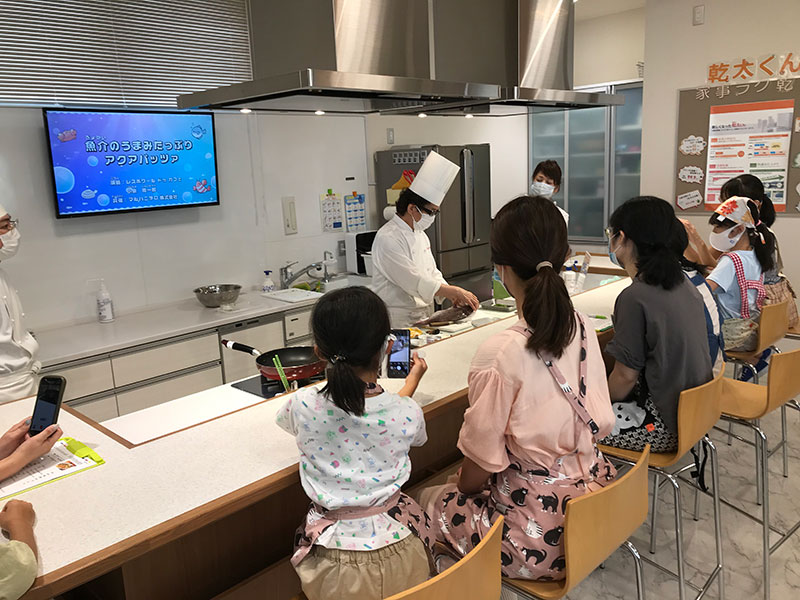
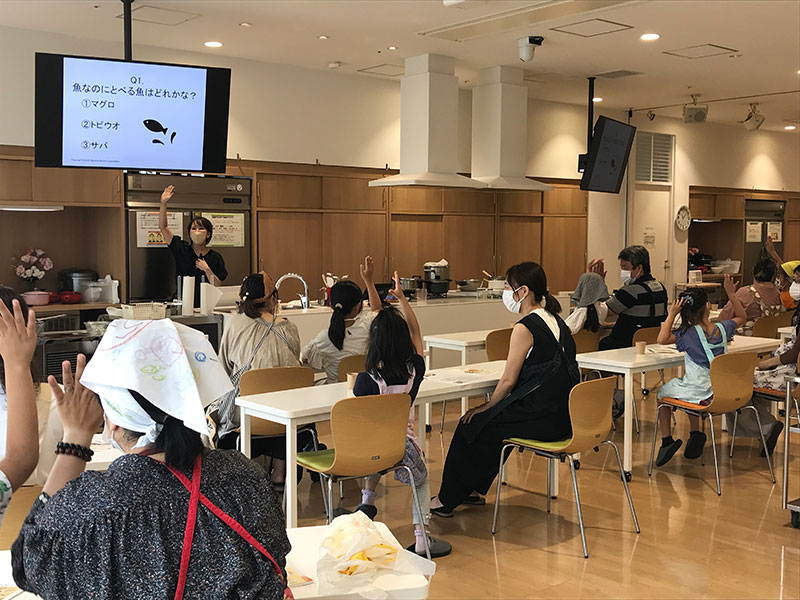
Case Study: Broadcasting of the "Fish Kitchen," Cooking Class for Parents and Children
As a new project in FY2021, we collaborated with Tokyo Bay Network to record the "Fish Kitchen," a cooking class for parents and children.
It was broadcast in Koto-ku and Chuo-ku for two weeks from March 27, 2022, and was further broadcast on cable TV throughout Japan, reaching 1.05 million households by July.
While it was difficult to hold cooking classes throughout Japan due to the COVID-19 pandemic, the Company's cooking advisors introduced easy yet authentic recipes using Maruha Nichiro's canned foods to inform a larger number of people about the joy and deliciousness of fish cuisine. This program can also be viewed at "Sakana Tabetara Fukukitaru" which is seafood promotion website.
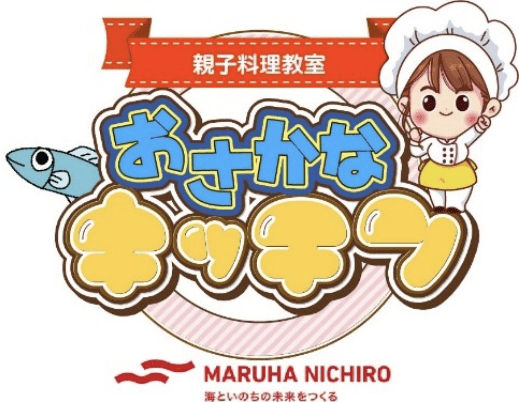
Sharing Information About Food Education
The Maruha Nichiro Group will disseminate a variety of information related to food education to our stakeholders. We disseminate information on our website for everyone to learn, enjoy and acquire knowledge our seafood promotion websites, Salmon Museum and Fish Gallery.
Environmental Activities
Case Study: Ongoing Cooperation with Tokyo Bay Restoration Eelgrass Project
Since 2014, the Maruha Nichiro Group has been cooperating in activities to restore eelgrass beds in Tokyo Bay, which improve the water quality of the bay and help to create a coastal environment where marine life can feed and breed. The company has also been selected as a cooperating company in the “Tokyo Bay UMI Project (Tokyo Bay Ocean Project)” by the Ministry of Land, Infrastructure, Transport and Tourism.
Eelgrass is a type of seaweed that grows wild in coastal sandy mud at depths of one to several meters and is called the “cradle of the sea” because it serves as a nursery and spawning ground for sea creatures. In addition to its water purification effects through the absorption of nutrients such as nitrogen and phosphorus, in recent years, eelgrass and other seaweed and seagrass beds have been attracting attention for the CO₂ “blue carbon” that they absorb and fix. Not only do they absorb CO₂ through photosynthesis and supply oxygen to the sea, but the carbon incorporated into the sediments on the seafloor of algal beds is stored for thousands of years, and thus there are growing expectations that they will become a new sink for global warming countermeasures.
The Maruha Nichiro Group has been collecting eelgrass sprigs as an internal Group event under the guidance of the NPO Seashore Creation Study Group, and held the event on Saturday, June 14, 2025 at Kanada Beach (Kisarazu City, Chiba Prefecture). Due to the effects of global warming, the growth of eelgrass was very poor, and it was not possible to collect flower branches. As an alternative, we carried out regeneration activities for koamamo*.
We will continue and expand our activities in cooperation with other groups and the government, aiming to quantify the results of our activities, such as biodiversity conservation and carbon dioxide absorption through eelgrass bed restoration activities.
* Koamamo forms an eelgrass field with seaweed such as eelgrass, and is an important "cradle of the sea" for sea creatures, where squid and fish lay eggs and serve as a refuge for small fish. Because the lower part density is extremely high compared to eelgrass and the proportion of the underground part in the grass is higher, it has a function of stabilizing the bottom quality, and plays an important role in the maintenance of tidal flats, the conservation of organisms from tidal flats to shallow areas, and continuous ecosystems. Protecting Koamamo also helps protect the life of the earth.
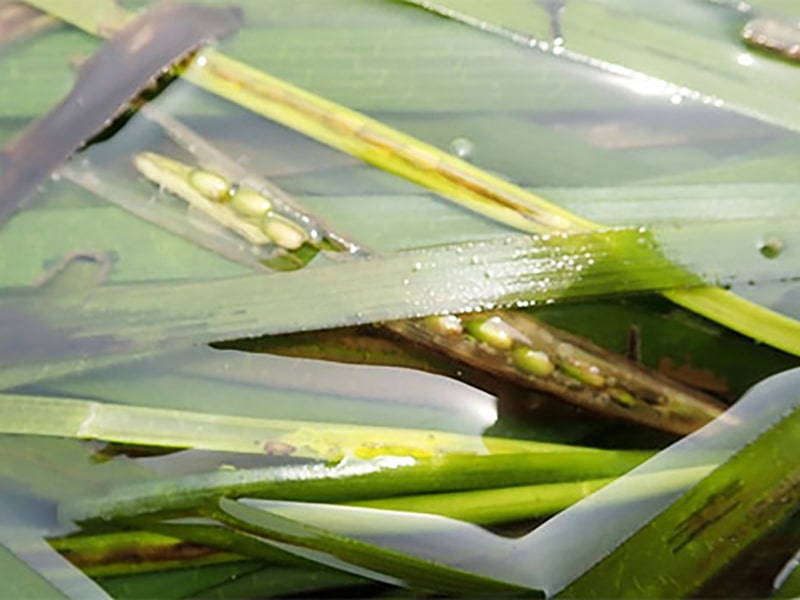
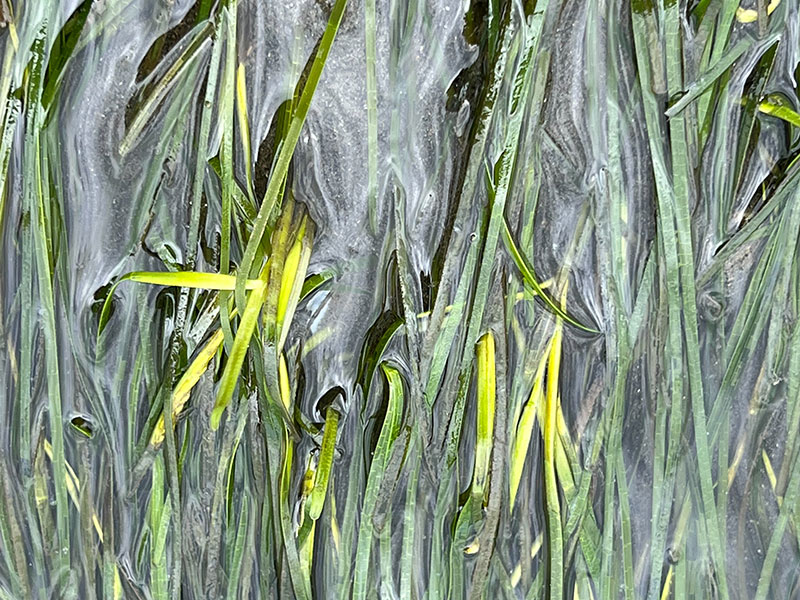
Case Study: Participation in Planting Eelgrass (PDF: 397 KB/ 2 pages)
Case Study: Participation in Yumewakame Workshop (PDF: 326 KB/ 1 page)
Case Study: Participated in Third Mangrove Reforestation in Amami Oshima
On Saturday, November 20, 2024, a mangrove tree planting was held in Setouchi Town, Amami Oshima, where the Maruha Nichiro AQUA Amami Plant is engaged in aquaculture business, and four employees from the plant and two employees from Maruha Nichiro Head Office participated.
Mangroves are a general term for plants that grow in tropical and subtropical wetlands, tidal flats, and estuaries where seawater fills at high tide. It is distributed along the coasts of Oceania, Southeast Asia, Africa, and southern North America, and is found on the islands of Okinawa in Japan and Amami Oshima in Kagoshima, Tanegashima, and Yakushima.
Backgrounds of Mangrove Reforestation
Setouchi Town has been working towards becoming a Zero Carbon City, and they have been studying the creation of mangroves and seaweed beds through the Aquaculture Department since 2023. The employees of Maruha Nichiro AQUA Amami Office have been actively cooperating from the stage of raising seedlings in the summer of 2023, which led to our participation in this reforestation event from January 2024.
Mangroves store carbon as trees as they grow, and organic matter, including dead branches and roots, accumulates in the mud on the seabed and continues to store carbon, so carbon storage efficiency is higher than that of forests, seagrasses, and seaweed. In Japan, this activity can only be done in the subtropical areas south of the remote islands of Kagoshima Prefecture.
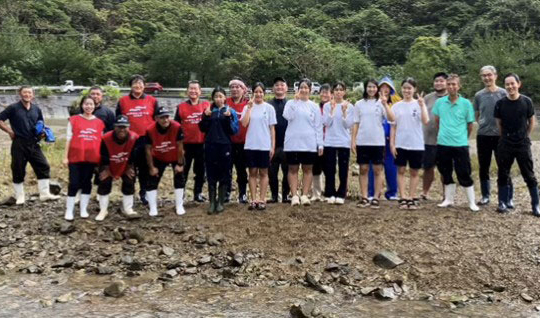
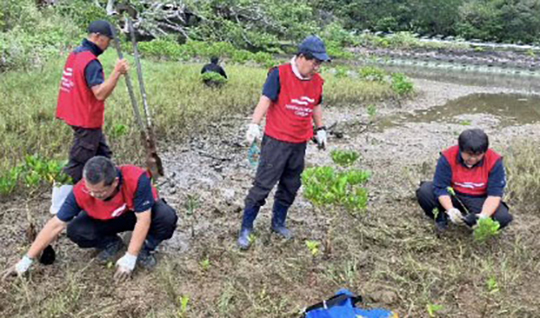
Case Study: Mangrove Reforestation in Indonesia
In March 2024, with the cooperation of our supplier, Mega Marine Pride (hereinafter referred to as MMP), a total of 5 employees from the Maruha Nichiro Group, ( 3 from Fisheries Department , 1 from Surabaya Representative Office, 1 from Maruha Shanghai) participated in the planting of 500 trees, along with 75 MMP employees.
About 15 years ago, we had experience planting mangroves in Thailand, but we wanted to carry out the initiative again, and with the understanding and cooperation of MMP, this tree planting was realized. In July 2025, our employees and MMP also carried out tree planting activities, and we hope to promote similar activities in different regions in the future.
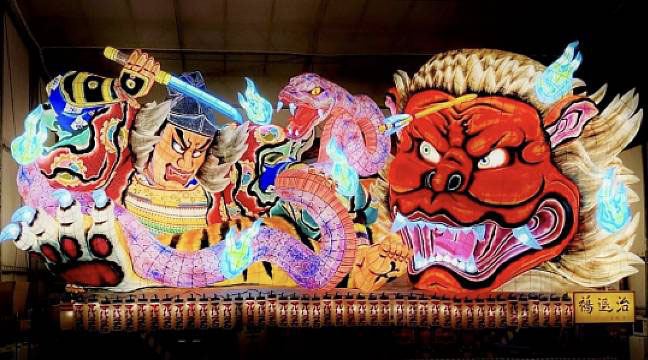
Case Study: “Make Sea Happy!” Coastal Cleanup Activity
“Make Sea Happy!” is the Group's cleanup activity taking into account the problem of marine plastics.
In these activities, in addition to simply picking up waste, the waste picked up is tabulated, recorded by the secretariat, and then provided to the Japan Environmental Action Network (JEAN Corporation) as part of its cooperation in surveys to provide information on waste.
Click here for information on "Make Sea Happy!" Cleanup Activities
Regional Contribution Activities
Case Study: Aomori Nebuta Festival
Maruha Nichiro has participated in the Aomori Nebuta Festival* every year for half a century (except some years) for the purpose of regional promotion since 1953, when it launched a large Nebuta.
This year was the 57th time the company has put on the festival. This year's theme, “ Utou Chunagon Yasukata and Ryujin" to celebrate the 400th anniversary of the opening of Aomori Port, and to pray for further leaps and tranquility, as well as the prosperity of Aomori City.
On the last day August 7, the Maruha Nichiro participated in a maritime operation in which the Nebuta on a barge for the first time in 13 years, operated at Aomori Port, and decorated the finale of the Nebuta Festival with the fireworks of the Aomori Fireworks Festival held at the same time.
* Aomori Nebuta is one of the three major festivals in Tohoku, designated as an Important Intangible Folk Cultural Asset by the national government.
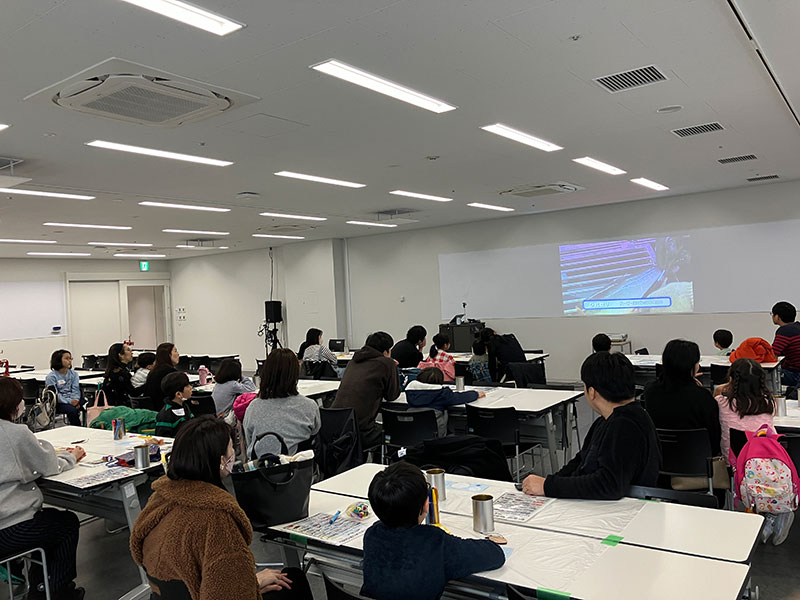
Case Study: Participation in the Toyosu Mirai Project Event
As part of the “Toyosu Mirai Project”, Maruha Nichiro conducted a “laminating aquarium” pasting your favorite “fish” cutouts on ocean designed paper. event held at Shibaura Institute of Technology on March 1, 2025!
The Toyosu Mirai Project is an educational program that has been implemented since 2019 by IHI Co., Ltd., SCSK Co., Ltd., Shibaura Institute of Technology, and Maruha Nichiro Co., Ltd., which are located in the Toyosu area, in cooperation with companies and universities that value science and technology.
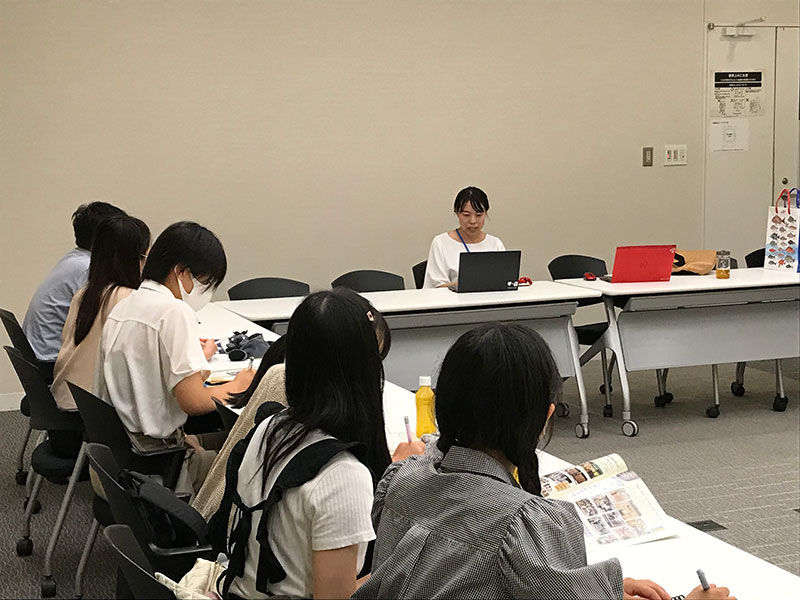
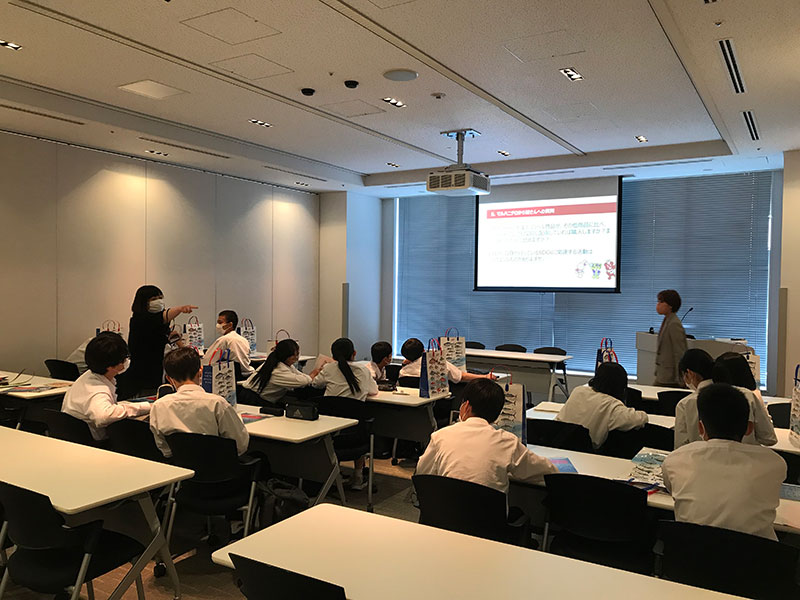
* Japanese only
Cultural and Educational Activities
Case Study: Activities to Support Education and Learning for Junior High School Students Through Study Visits
As part of our support for the education and learning of junior high and high school students, the Maruha Nichiro Group regularly accepts visiting students to provide opportunities to learn and deepen their understanding of the company's business offerings and SDGs initiatives.
In FY2024, we accepted visitings for example, Azuma Junior High School(Fukushima city), No. 8 Junior High School (Yamagata) City, Nanbu Junior High School (Iwakura, Aichi), and Saga Nishi High School (Saga), and introduced our business content and initiatives to achieve the SDGs through our business activities. As interest in the SDGs is increasing throughout society, there are more opportunities to learn about the SDGs as part of the school curriculum, and inquiries from junior high and high school students and university students about corporate initiatives are also increasing.
In response to the increasing demand, Maruha Nichiro launched a social contribution human resource registration system in FY2024. In addition to those in charge of the Sustainability Strategy Department, employees who have applied for the Social Contribution Human Resources Registration System will receive in-house training and then serve as lecturers for visiting students.
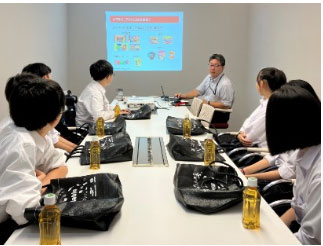
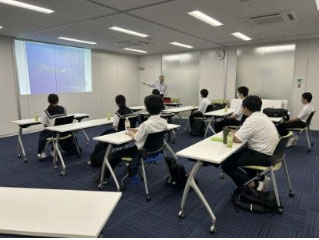
Case Study: Yayoi Sunfoods Co., Ltd. Activities to Support Cambodia Yayoi School
The Yayoi School of Cambodia is a school building donated by the former Yayoi Foods in 2008 to Kontarnang Elementary School in Cambodia in cooperation with JHP and the Association for Building Schools as part of the 60th anniversary project of the company.
Since the implementation of support activities in fiscal 2019, we have continued to provide material support rather than visiting local areas due to the impact of the new coronavirus, but in fiscal 2024, in response to the 10th anniversary of Yayoi San Foods Co., Ltd.'s establishment, we visited the site for the first time in five years as part of the anniversary project and carried out support activities. At Cambodian Yayoi School, in addition to interacting with children through tug-of-war, volleyball, and playing handmade musical instruments, we also repainted the classrooms that were requested by the school.
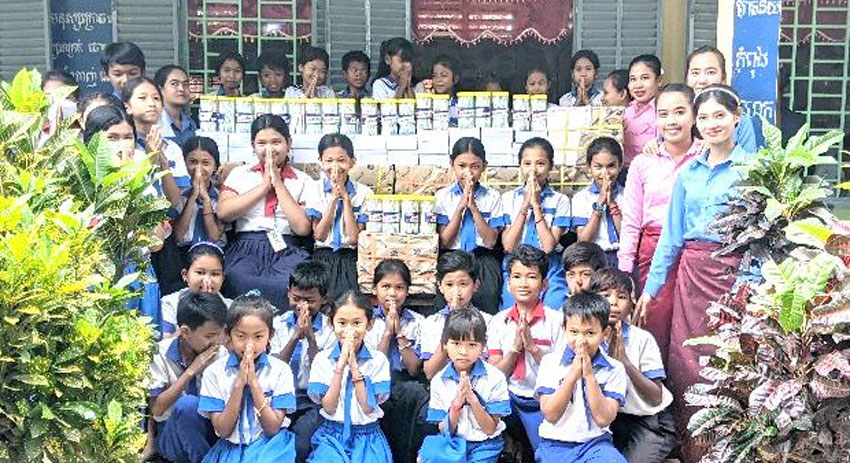
Activities Related to Donations
Case Study: Support for Food Banks / Children's Cafeterias
Since 2009, the Maruha Nichiro Group has been donating products that can no longer be sold even though they are still edible to NPOs engaged in food bank activities*. In fiscal 2024, Maruha Nichiro Group donated frozen foods and other items to organizations such as Second Harvest Japan, Food Bank Kanagawa, and Food Bank OSAKA, which are engaged in food bank activities.
* Food bank activities: Activities to provide free of charge to the needy products that have become difficult to distribute for various reasons, even though they are still edible enough.

